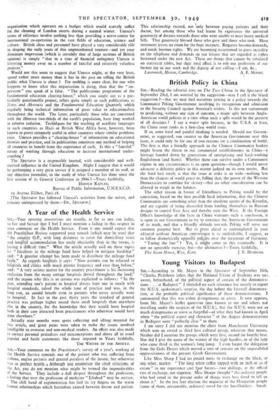British Policy in China
Sts,—Reading the editorial note on The Two Chinas in the Spectator of September 23rd, I am worried by the suggestion—may I call it the bland suggestion ?—that we may find ourselves joining in a policy towards the Communist Peking Government involving its recognition and admission to the Security Council against America's wishes. Is this not tantamount to predicting, without any sign of concern, a major split between Anglo- American world policies at a time when such a split would be the greatest of all disasters ? I say a major split because, in the U.S.A. at least, the China issue ranks as a first-class world issue.
If so, some hard and painful thinking is needed. Should our Govern- ment, as suggested, run counter to the American Government over this issue, it could only be for one of two reasons (or a combination of both). The first is that a friendly approach to the Chinese Communist leaders might lessen the threat to our commercial establishments in China—a heritage handed down by generations of enterprising and hard-working Englishmen (and Scots). Whether these can survive under a Communist regime in any circumstances is an open question—though I would never advocate a defeatist policy in this matter judged on its own merits. But the hard fact surely is that the issue at stake is so wide—nothing less than the chances of world peace or, falling that, the power of the Western Democracies to combine for victory—that no other consideration can be allowed to weigh in the balance.
The other reason in favour of friendliness to Peking would be the conviction, based on the best possible local inforination, that the Chinese Communists arc something other than the obedient agents of the Kremlin, and are capable of being dissuaded from lending themselves to Russian designs to control East Asia and thereby ruin the West. If the Foreign Office's knowledge of the facts in China warrants such a conclusion, it is open to our Government to try to convince the American Government of its truth, and that a friendly attitude towards Peking will serve our common purpose best. But to gross ahead as contemplated in your editorial without American concurrence is as unthinkable, I suggest, as to follow diametrically opposite polkies over the treatment of Germany.
"Toting the line " ? Yes, it nilght come to this eventually. It is not an agreeable exercise, but—the alternative ?—Yours faithfully,














































 Previous page
Previous page